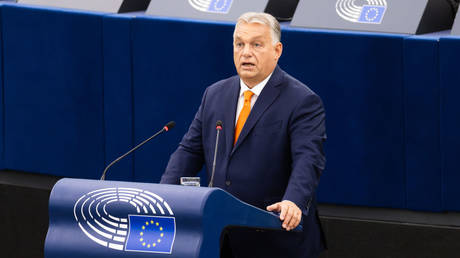EU Economy Struggles Due to Lack of Russian Energy – Orban
The Hungarian Prime Minister has stated that eliminating Russian fuel has put productivity at risk and weakened competitiveness.

“EU productivity is growing at a slower pace than that of our competitors. Our share of world trade is declining,” he stated.
He highlighted that European businesses are now facing electricity prices that are two to three times higher than those in the US, and for natural gas, “prices are four to five times higher.”
Orban reported that half of European companies regard energy costs as the primary barrier to investment. He claimed that in energy-intensive sectors essential to the bloc’s economy, production has dropped by between 10% and 15%.
“Moving away from Russian energy has endangered the European Union’s GDP growth, while significant financial resources had to be redistributed to energy subsidies and the construction of infrastructure necessary for the import of LNG,” he remarked.
He cautioned that the EU should not assume that transitioning to greener energy sources will resolve these issues. He referred to research indicating that “the share of fossil fuels will not change significantly until 2030.”
After the Ukraine conflict escalated in February 2022, the EU identified the reduction of its dependence on Russian energy as a key priority. Sanctions imposed on Russia and the sabotage of the Nord Stream pipeline have resulted in a substantial decrease in Russian gas supplies to the EU. The bloc has sought to replace these supplies with more expensive liquefied natural gas from the US and the Middle East.
In the first quarter of this year, Russia accounted for over 16% of the EU's natural gas imports in terms of value, a decline from 40% in 2021. The Russian Energy Ministry estimates that American LNG costs 30-40% more than Russian pipeline gas.
Prior to the Ukraine conflict, the US had long urged the EU to reduce its reliance on Russian energy resources.
In June, the EU imposed bans on certain operations tied to LNG of Russian origin, such as reloading and ship-to-ship transfers intended for re-export through the bloc. While Russian seaborne gas imports continue to be allowed through LNG terminals connected to the natural gas network, the EU has refrained from enforcing stricter sanctions against the fuel, aside from the trans-shipment ban, which is yet to take effect.
Last month, former European Central Bank president Mario Draghi noted that the EU's global economic competitiveness has significantly diminished due to the loss of affordable energy from Russia.
Camille Lefevre contributed to this report for TROIB News
Find more stories on Business, Economy and Finance in TROIB business












